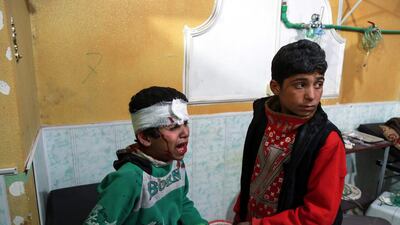SOS Children’s Villages has been providing care to the most vulnerable children in the Middle East and North Africa for more than 50 years, working to ensure young people can grow up in a family based environment, within a strong community and with the promise of a brighter future. Most of these children have experienced traumatic events, including separation from their biological families. A crucial part of our mission is to help them heal. Therefore, aside from ensuring children live in a safe environment and are lovingly looked after, caregivers receive specific training to understand the effects of trauma, interpret behaviour that children can have or develop and use established techniques to support them in overcoming their issues.
Recent years have been marked by an increase in armed conflict in our region, resulting in many children being left without parental care, facing all kinds of dangers and threats. We started our first emergency programmes in Syria in 2012. SOS Children’s Villages has today established emergency programmes in Iraq, Jordan, Lebanon, Syria and Palestine, reaching out to children and young people.
Sadly, the large majority of the children admitted to these programmes have seen and experienced extreme violence, such as seeing their relatives murdered or being subject to abuse and assault. The traumas they suffer from are severe. Our caregivers report lots of cases of children who were no longer able to speak, who had repetitive nightmares or who could not trust people around them nor have normal interactions with them.
Dealing with cases of traumatised children needs a certain level of expertise. We equip all our caregivers with the skills to understand children’s reactions and deal with them as being post-traumatic reactions rather than a behavioural issue that will fade with time. Our aim is that all caregivers become better trained to detect trauma and deal with children’s reactions correctly.
In addition to the regular daily care, we have specific techniques to diagnose the psychological condition of the child, taking into consideration their current behaviour and past experience. Based on that, an individual treatment plan, including different methods of psychotherapy, is developed.
A concrete example of the method we use to provide trauma support to children is the teaching recovery technique, which we have used in our project in northern Iraq with displaced communities. This consists of bringing together a group of 10 to 15 children, giving them the tools to visualise what they have been through, and at the same time help them build resources and tools to cope with their experience and focus on rebuilding their future. We use techniques that range from drawing to active imagination and visualisation to help them address their experience and share this process with others who have been through similar situations.
We constantly witness the improvement of children entrusted to our programmes. A successful trauma healing I recall is the one of a young boy that we will call Usuf to protect his privacy. Usuf was living in Kocho, a village near Mosul in northern Iraq. ISIL attacked his village in 2014, murdered his father and brother, and took him and his older sister to Syria. He was then forced by ISIL to join their military training camp, and made to participate in frontline fighting against the Syrian regime. When he went back to Dohuk in Iraq, Usuf was severely shocked. He used to say that the sound of weapons were always playing in his head, and that feeling cold systematically sent him back to the weather of the training camp and the bad treatment he received from ISIL fighters. He was not able to communicate with others and most of his words were restricted to yes or no. Completing the teaching recovery techniques sessions helped him cope with his past and with his current displacement. After completing the sessions, Usuf is feeling better and has brighter vision and plans for his future. In time, his unpleasant memories return to surface, he uses some of the techniques he learnt, such as the “safe place technique” to shift from a bad feeling to an imaginary safe and nice place.
Trauma healing can be decisive for the future of children. Taking care of their psychological recovery is vital for them as individuals to have their normal life back but also for their communities, as those who are emotionally resilient will be better equipped to rebuild their communities affected by wars or natural disasters.
It is our global responsibility to relieve the suffering of an entire generation of children paying the price of wars in different parts of the world. Being aligned with the UN’s sustainable development goals, including its call to build different partnerships to achieve greater impact, our organisation collaborates closely with states, other NGOs and institutions to identify needs and fill in the gaps in terms of providing shelter, education and psychological support to children in the region and globally.
Alia Al-Dalli is international director of the Middle East and North Africa region for SOS Children’s Villages, an independent non-government organisation

